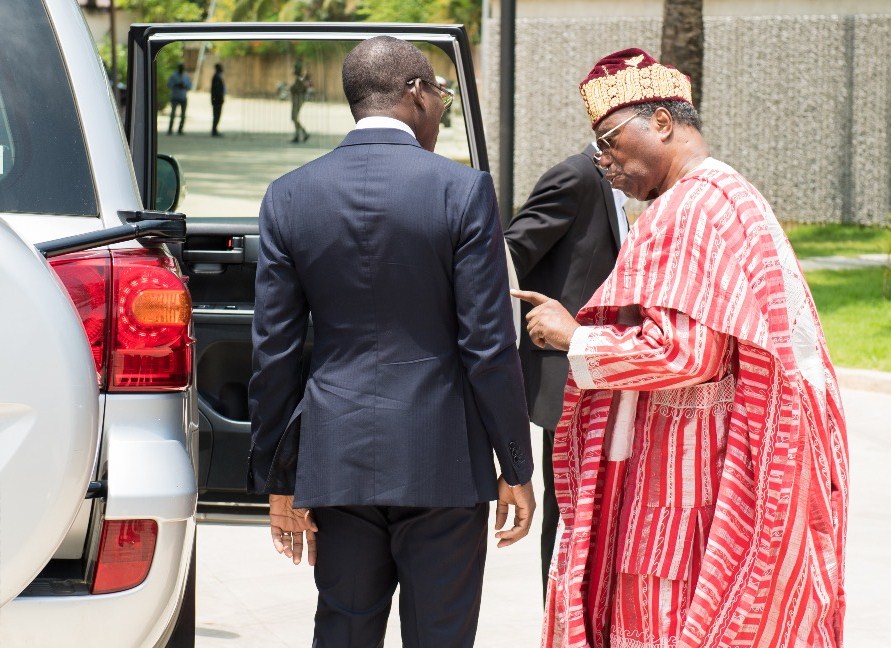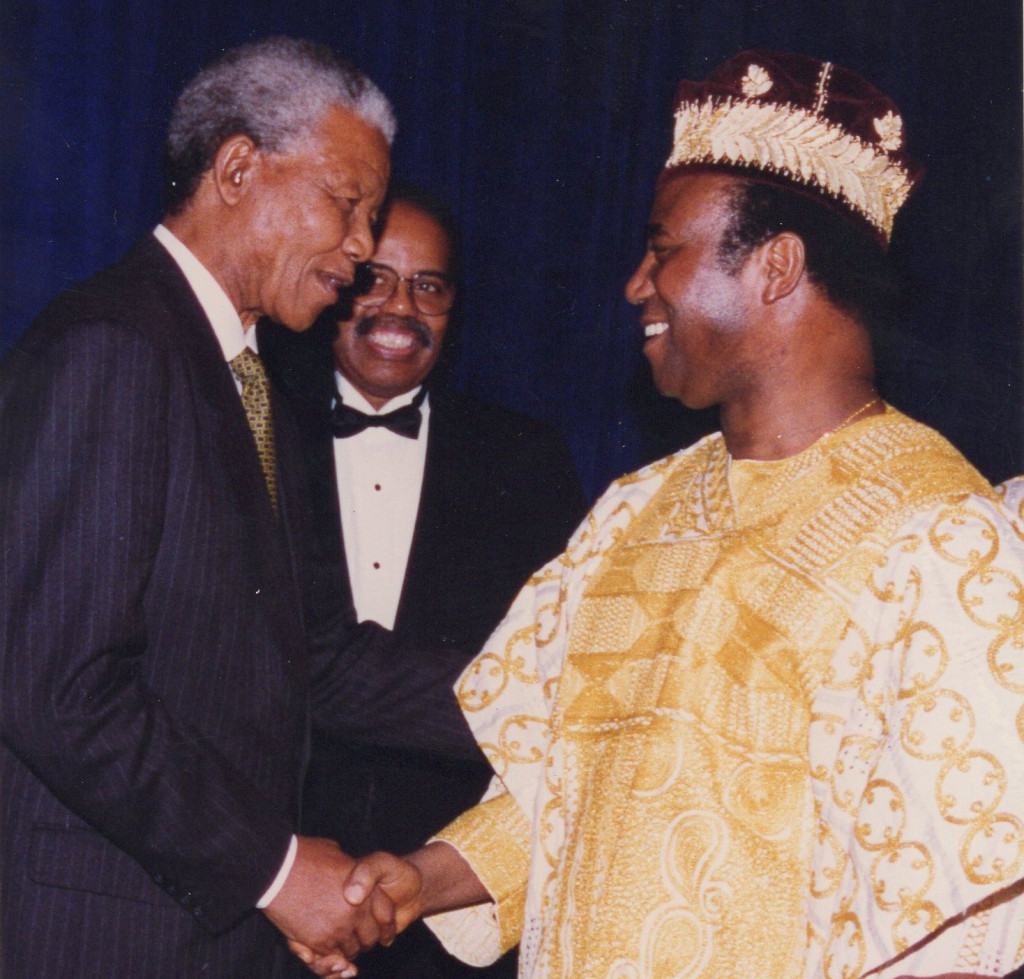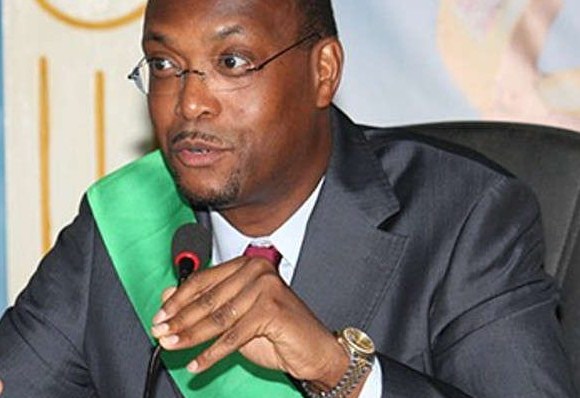Why the feud between the Soglo family and President Talon?

BY SOUMANOU SALIFOU
The recent abrupt two-month suspension of Cotonou mayor Lehady Soglo, followed, five days later, by his outright removal from office, has a lot—but not everything—to do with the mayor violating his own office. Legal and local administration experts across the political spectrum here in Benin have criticized the hasted process, raising issues that go beyond the “grave faults” the mayor has been punished for. But little, if anything at all, has been said or written about the very trademark of the Soglos that has gotten this high-profile family in deep trouble time and time again, including this instance: their penchant for bellicosity that sometimes climaxes into outright provocation.
THE SOGLOS’ RISE TO NATIONAL PROMINENCE
Though Gen. Christophe Soglo was the president of Benin from October 1963 to January 1964, and later for the longer time period of November 1965 through December 1967 after a coup, the Soglo family has never before enjoyed the national prominence it now has. The current known head of the family, Nicephore Soglo, 85, served as interim prime minister from March 1990 to March 1991 following the historical ‘conference of the living forces of the nation’ that paved the way for Benin’s embrace of democracy—a move mimicked, to lesser success, by several other African nations—while various institutions of the new republic were being established. Soglo later served a brilliant five-year term as president from 1991 to 1996. After a devastating re-election defeat in 1996, he was elected mayor of Cotonou, the largest city in Benin dubbed the nation’s economic capital.
Soglo’s spouse, Rosine Vieyra Soglo, 81, a lawyer by training, is the founder of one of Benin’s main political parties, “Renaissance du Benin.” She’s currently the longest-serving member of parliament, totaling 22 years of service. The couple’s oldest son, Lehady Soglo, 57, served as a special assistant to his father during the latter’s tenure as president, then as his father’s deputy in the mayor’s office. Lehady rose to the position of mayor in August 2015 after out-maneuvering his father who was then on travel out of the country. Finally, the couple’s youngest son, Ganiou Soglo, 56, now a farmer, was appointed to two different cabinet positions by President Yayi Boni in 2007 and 2008.
SOGLO GOES DOWN IN HISTORY AT HOME AND ABROAD

Propelled out of his quiet retirement into politics by his choice as interim prime minister by the ‘conference of the living forces of the nation’ held in November 1989, and after an amazing performance between March 1990 and March 1991, Soglo developed an appetite for politics, ran for president in March 1991, and beat former president Mathieu Kerekou at the polls to become Benin’s first president of the democratic era. The former World Bank administrator performed a quasi-miracle at home by resurrecting the economy brought on its knees by 17 years of pseudo Marxist rule under Kerekou, and abroad by turning Benin into a promising model of economic revival and democratic progress in Africa. President Soglo, the sweetheart of the donor nations, traveled all over the world in search of assistance of all kinds. Soglo, then the president of the non-strategic, poor nation of Benin that rarely—if ever—came up in world-scale discussions, was chosen to deliver the keynote speech in a major hotel in Washington on October 6, 1994 on the occasion of a high-profile function in honor of then-South African president, Nelson Mandela, with the cream of the cream of Washington and New York in attendance by the hundreds.
THE SOGLOS AGAINST ALL
Soglo’s re-election in March 1996 was a given, at least so most people at home and abroad thought. But that did not happen, because the president and his spouse had turned the entire political elite and the local media against them.
Rosine Soglo, a blunt, atypical first lady–definitely the killer of her husband’s political career–took the front seat in the administration, walking on the toes of both her husband’s aides and the ferocious opposition, always eager to call names. President Nixon’s feud with the media pales in comparison to Rosine and Nicephore Soglo’s clashes with the Benin media. The insults that went both ways were sometimes so gross they cannot be repeated in this report.
Rosine Soglo’s front-seat role in her husband’s administration earned her the title of “President” in the local media, with her brother, the late Desire Vieyra who served in the cabinet as senior minister in charge of planning, being nicknamed “first vice president,” while the president himself was relegated to the position, in the eye of the media, of “second vice president.”
On the political front, the members of the local elite who were on the receiving end of the presidential couple’s unabated insults formed a powerful coalition that performed a near-miracle by convincing the retired former head of state, Gen. Mathieu Kerekou, to run against Soglo in the March 1996 presidential contest. Run Kerekou did, and won with a small margin. According to some accounts, Soglo actually won, but undetected electoral frauds in some locations led the retired general to victory.
PRESIDENT SOGLO, THE MAKER OF PRESIDENTS
Yayi Boni, once an assistant to the chief of the Counsel of Economic Advisors to President Soglo, Dr. Yacouba Fassassi, was appointed by President Soglo in December 1994 as chairman of the West African Development Bank, a high-profile position that paved the way for Yayi’s election as president of Benin in 2006. The current president of the country, Patrice Talon, is a product of President Soglo’s vision, dating back to his tenure as president, to promote a local bourgeoisie. Not only does Talon owe to President Soglo his entry, and, later his breathtaking success in the cotton industry to become the richest man in Benin, also he would not have won the highest office in the land last year without Soglo’s vigorous campaign for him.

Several sources interviewed for this article have stressed Talon’s gratitude to his mentor over the years, both in cash and in kind. President Soglo’s oldest son, Lehady, has also been a beneficiary of Talon’s largesse. The cotton magnate spared no efforts to arrange and fund a lavish wedding for the now-former mayor of Cotonou. But, in recent months, the relationship between President Soglo, his spouse, and their son Lehady on the one hand, and President Talon on the other, sharply deteriorated.
In an address to a large audience attending a political rally last June, President Soglo complained that Talon had paid him only one visit since becoming president: “During that visit,” President Soglo said, “I told him: in politics you listen to the people. One has to learn to listen to the people.” Furthermore, in protest of his son’s suspension, Soglo shocked the nation by remaining seated when President Talon shook his hand at the recent August 1 Independence Day parade.
By the same token, for reasons that none of the dozen people we have interviewed for this article could clearly explain to us, other than calling it sheer provocation, Lehady Soglo has developed a sharp adversity towards President Talon, especially after the head of state’s recent health concerns. The former mayor has made several public comments about the president in terms too vulgar to be repeated in this article.
For her part, former first lady Rosine Soglo lived up to her reputation by making inflammatory remarks after her son’s suspension on July 28. Having said initially that the suspension was a punishment for her voting against President Talon’s failed attempt to change the constitution, she later remarked that Talon has two children, and stated publicly and loudly that she would hurt his children if he hurts her child. “If he [Talon] doesn’t kill me, I will kill him,” Rosine Soglo said with a straight face.
THEN CAME TIME TO PAY THE PRICE
In the opinion of many political analysts here, these warlike statements are not foreign to the mayor’s removal from office without due process.
The analysts point out the unusual four consecutive audits of the mayor’s office that revealed no wrongdoing, then the Talon administration’s alleged attempt to remove Lehady from office by “manipulating” some members of the municipal council to cast a vote of no-confidence against the mayor; a move that also failed. So the nuclear option was the mayor’s abrupt suspension based on a ten-point criticism of his records, followed by his outright removal five days later. Out of the ten points, experts say only two really have a base. They add it’s odd the judiciary inquiry immediately followed the administrative inquiry, which led to searching the former mayor’s house, without giving him the legally-required lapse to answer in writing.
To give the impression of real, widespread wrongdoing at the mayor’s office, the authorities are subjecting several top executives at the mayor’s office to harsh interrogations at a police commissioner’s office specialized in economic malpractice. With the executives—not under arrest—being assisted by their lawyers, this has so far been an exercise in futility.
SPIRITUAL EXPLANATION
Here in Benin, everything has a spiritual explanation. In the minds of many, including people with college degrees who are members of the country’s elite, Lehady Soglo’s removal from office was bound to happen as a punishment for taking advantage of his father’s overseas travel to file papers and steal his job. Proponents of this theory note that it’s no coincidence the suspension happened exactly on the second anniversary of Lehady taking charge as mayor. They also find a parallel in history going back to King Gbehanzin who usurped the throne from his elder brother Ahanzo in 1889, only to lose it to the French colonial power in 1894 after a bloody, protracted war of resistance that claimed tens of thousands of lives, and ended nearly three centuries of the glorious hegemony of the dynasty that started in 1600 with the ancestor Gangnihessou.
________
Abdallah Salifou has contributed to this report.


